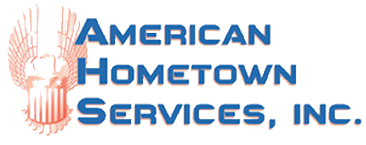Mold is something that people have either experience with, whether or not they even realize it. More often than not, mold is easily contained with regular cleaning. But mold thrives in dark, moist places, and can take root without anyone being aware of its existence until it has overwhelmed an area. Today, we at American Hometown Services would like to share the answers to the most frequently asked questions concerning mold for those who have questions they seek answers to. If you do not see your question listed, feel welcome to call us and we will happily answer the questions you have.
Mold FAQ
Q: How does mold prosper?
A: Mold can prosper in many situations, the more favorable the conditions, the quicker it will grow. Favorable conditions for mold include
1) Moisture – Humidity roughly 50% or higher is ideal. Leaking or dripping pipes or faucets, or a water intrusion caused by flooding are often what supplies mold with the moisture it needs.
2) Food – Mold will feed on cellulose and organic materials like paper, leather, and wood. Drywall is a perfect source with the paper coating it offers the mold spores. If other conditions are excellent, mold can even thrive in dirt or dust.
3) Temperature – Spores can survive in temperatures just above freezing and as high as 120 degrees Fahrenheit. Temperatures ranging from 70 degrees to 90 degrees Fahrenheit are preferable.
4) Time – Depending on the conditions, mold can grow in as less as 24 hours than and as much as 10 days.
5) Stagnant air – Insufficient air circulation and lack of ventilation can increase moisture buildup, giving mold more opportunity.
Q: Symptoms of mold in buildings
A: Mold is naturally found outdoors, but can make its way inside with varying circumstances. Some examples include the following:
– Severe storms or overflowing surface waters, like rivers, causing flooding to reach inside your home or business.
– Roof leaks caused by damaged roof components; shingles, ice dams, or even blocked gutters.
. – Rain waters pooling up at windows or door entry.
– Sewer backups, leaking plumbing pipes, or malfunctioning appliances that cause indoor floods.
– Basements or crawl spaces continually dampened due to a high water volume or poorly managed rainwater drainage.
– Condensation
Q: Is mold growth preventable?
A: Yes, controlling the excessive moisture or condensation buildup is essential. Every nook and cranny of your home or business needs to be kept clean and dry to prevent mold from taking root, even if mold spores are introduced inside your building. Proper ventilation and control the humidity levels can help as well.
Q: Is mold exposure harmful?
A: Some species of mold can be toxic. Mold spores produce metabolites or mycotoxins and in built in environments it is capable of tripling the helical glucan. Prolonged exposure to mold has been linked to some ill effects, but studies and tests are still being performed to determine more pertinent information concerning the potential harm it can.
Q: Should I be concerned about mold infestations in my home or business?
A: Small quantities are not a major concern, like the mildew in the shower that can be easily treated with household cleaners. If you discover a major outbreak it can be a health risk, and getting professional medical care and mold removing experts should be your top priority.
Q: What are the side effects of long term mold exposure?
A: It is very common for people to be allergic to mold and have allergy symptoms. In some documented cases, flu-like symptoms and rashes may also occur, as well as induce asthma attacks for those suffering from asthma. Infants, children, elderly, pregnant women, people who suffer from allergies, asthma, or respiratory problems, and those with weak immune systems are more likely to be inflicted to the presence of excessive mold.
Mold Removal, Remediation & More in Quincy, Macomb, Hamilton, Warsaw & East Alton Illinois | Hannibal, Missouri
If you discover mold in your home or business, contact the professionals at American Hometown Services and let our experts handle it.




